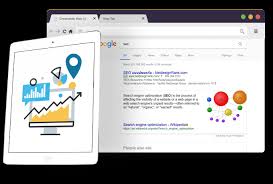The Power of Digital Marketing for Small Business
In today’s digital age, having a strong online presence is crucial for the success of any small business. Digital marketing offers small businesses a cost-effective way to reach their target audience, build brand awareness, and drive sales. Here are some key strategies that small businesses can leverage to make the most of digital marketing:
Social Media Marketing
Social media platforms such as Facebook, Instagram, and Twitter provide small businesses with a powerful tool to engage with their customers and promote their products or services. By creating compelling content and interacting with followers, small businesses can build a loyal customer base and increase brand visibility.
Search Engine Optimization (SEO)
Optimizing your website for search engines is essential for improving your online visibility and driving organic traffic to your site. By using relevant keywords, creating high-quality content, and building backlinks, small businesses can improve their search engine rankings and attract more potential customers.
Email Marketing
Email marketing remains one of the most effective ways to nurture leads and convert them into customers. Small businesses can use email campaigns to send targeted messages to their subscribers, promote special offers, and keep customers informed about new products or services.
Pay-Per-Click (PPC) Advertising
PPC advertising allows small businesses to target specific keywords and demographics to reach potential customers through paid ads on search engines and social media platforms. By carefully monitoring ad performance and adjusting campaigns as needed, small businesses can maximise their return on investment.
Content Marketing
Creating valuable and relevant content is key to attracting and retaining customers online. Small businesses can use blogs, videos, infographics, and other types of content to showcase their expertise, educate their audience, and establish themselves as industry leaders.
In conclusion, digital marketing offers small businesses a plethora of opportunities to grow their online presence and connect with customers in meaningful ways. By implementing a well-rounded digital marketing strategy that incorporates social media marketing, SEO, email marketing, PPC advertising, and content marketing, small businesses can effectively compete in today’s competitive marketplace.
9 Advantages of Digital Marketing for Small Businesses: Boosting Visibility, Engagement, and Growth
- Cost-effective compared to traditional marketing methods
- Allows for targeted advertising to reach specific audiences
- Provides real-time data and analytics for campaign performance tracking
- Increases brand visibility and awareness in the online space
- Enables small businesses to compete with larger competitors on a level playing field
- Facilitates direct interaction and engagement with customers through social media
- Offers flexibility to adjust strategies quickly based on performance insights
- Helps generate leads and drive conversions through various digital channels
- Enhances overall customer experience by providing personalised and relevant content
Challenges of Digital Marketing for Small Businesses: Navigating Costs, Time, Learning, Competition, and Change
- 1. Costly Investment
- 2. Time-Consuming
- 3. Steep Learning Curve
- 4. Intense Competition
- 5. Rapid Changes
Cost-effective compared to traditional marketing methods
Digital marketing offers a significant advantage for small businesses by being cost-effective compared to traditional marketing methods. With digital marketing strategies such as social media marketing, email campaigns, and pay-per-click advertising, small businesses can reach their target audience at a fraction of the cost of traditional advertising channels like print or TV ads. This affordability allows small businesses to allocate their resources more efficiently and achieve a higher return on investment, making digital marketing an invaluable tool for growth and success in today’s competitive market landscape.
Allows for targeted advertising to reach specific audiences
Digital marketing for small businesses offers the significant advantage of allowing targeted advertising to reach specific audiences. By utilising tools such as social media advertising, search engine optimisation, and email marketing segmentation, small businesses can tailor their marketing efforts to reach the most relevant audience for their products or services. This targeted approach not only increases the chances of reaching potential customers who are more likely to convert but also helps in maximising the return on investment by focusing resources on those who are most likely to be interested in what the business has to offer.
Provides real-time data and analytics for campaign performance tracking
Digital marketing for small businesses offers the invaluable benefit of providing real-time data and analytics for tracking campaign performance. By utilising digital tools and platforms, small businesses can access immediate insights into how their marketing efforts are performing. This real-time data allows businesses to make informed decisions, adjust strategies on the fly, and optimise campaigns for better results. With the ability to track metrics such as website traffic, conversion rates, and customer engagement in real-time, small businesses can effectively measure the success of their digital marketing initiatives and make data-driven improvements to achieve their goals efficiently.
Increases brand visibility and awareness in the online space
One significant advantage of digital marketing for small businesses is its ability to enhance brand visibility and awareness in the vast online space. Through strategic online campaigns, small businesses can reach a wider audience, engage with potential customers, and establish a strong online presence. By utilising various digital marketing channels such as social media, search engine optimisation, and email marketing, small businesses can effectively showcase their brand to a global audience and differentiate themselves from competitors. This increased visibility not only helps in attracting new customers but also reinforces brand loyalty among existing ones.
Enables small businesses to compete with larger competitors on a level playing field
Digital marketing presents a significant advantage for small businesses by enabling them to compete with larger competitors on a level playing field. Through targeted digital marketing strategies such as social media campaigns, search engine optimization, and pay-per-click advertising, small businesses can reach their target audience effectively and compete with larger corporations without the need for a massive marketing budget. This levels the playing field and allows small businesses to showcase their products or services alongside industry giants, ultimately increasing their visibility and market share in the digital landscape.
Facilitates direct interaction and engagement with customers through social media
Digital marketing for small businesses offers the significant advantage of enabling direct interaction and engagement with customers through social media platforms. By leveraging social media channels such as Facebook, Instagram, and Twitter, small businesses can establish a more personal connection with their target audience. This direct engagement allows businesses to respond to customer inquiries, address feedback promptly, showcase their products or services creatively, and build relationships that foster brand loyalty. Overall, the ability to engage directly with customers through social media plays a crucial role in enhancing brand visibility, increasing customer satisfaction, and driving business growth in the digital landscape.
Offers flexibility to adjust strategies quickly based on performance insights
Digital marketing for small businesses offers the valuable advantage of flexibility to swiftly adjust strategies based on performance insights. By leveraging analytics and monitoring tools, small businesses can gather real-time data on the effectiveness of their digital marketing campaigns. This allows them to identify what is working well and what needs improvement, enabling them to make informed decisions and optimise their strategies promptly. With the ability to adapt quickly to changing trends and consumer behaviour, small businesses can stay agile and maximise their marketing efforts for better results in a dynamic online landscape.
Helps generate leads and drive conversions through various digital channels
Digital marketing for small businesses provides a significant advantage by helping to generate leads and drive conversions through various digital channels. By leveraging strategies such as social media marketing, search engine optimisation (SEO), email marketing, pay-per-click (PPC) advertising, and content marketing, small businesses can effectively reach their target audience and encourage them to take action. These digital channels offer a cost-effective way to engage with potential customers, build brand awareness, and ultimately increase sales and conversions.
Enhances overall customer experience by providing personalised and relevant content
Digital marketing for small businesses offers a significant advantage by enhancing the overall customer experience through the delivery of personalised and relevant content. By tailoring marketing messages to individual preferences and behaviours, small businesses can engage customers on a more personal level, increasing satisfaction and loyalty. This personalised approach not only fosters stronger relationships with customers but also helps businesses stand out in a crowded digital landscape, ultimately leading to improved brand perception and increased customer retention rates.
1. Costly Investment
Digital marketing, while offering numerous benefits to small businesses, can also present a significant challenge in terms of cost. Implementing effective digital marketing strategies often requires a substantial financial investment, which can be particularly daunting for small businesses operating on limited budgets. From paid advertising campaigns to hiring skilled professionals or investing in marketing tools and software, the costs associated with digital marketing can quickly add up. Small businesses must carefully weigh the potential return on investment against the upfront costs to ensure that their digital marketing efforts align with their budgetary constraints and business goals.
2. Time-Consuming
One significant drawback of digital marketing for small businesses is its time-consuming nature. Effectively managing digital marketing campaigns requires a considerable amount of time and effort, which can divert the attention of small business owners from other critical tasks. Constantly monitoring and optimising campaigns, creating engaging content, and analysing performance metrics demand a significant investment of time that could otherwise be allocated to core business operations. This time commitment can pose a challenge for small business owners who already have limited resources and competing priorities to manage.
3. Steep Learning Curve
For small business owners without prior experience, one significant drawback of digital marketing is the steep learning curve involved in understanding complex strategies like SEO and PPC advertising. Navigating the intricacies of these techniques can be daunting and time-consuming, requiring a deep understanding of algorithms, keyword research, bidding strategies, and analytics. This learning curve can pose a barrier for small businesses looking to effectively utilise digital marketing to promote their products or services online.
4. Intense Competition
In the realm of digital marketing, small businesses frequently encounter a significant drawback: intense competition. The online landscape is saturated with businesses vying for the attention of consumers, making it challenging for small enterprises to distinguish themselves and capture the interest of potential customers. Standing out amidst the sea of competitors demands strategic planning, innovative approaches, and a deep understanding of target audiences to carve out a distinct identity and secure a foothold in the competitive digital arena.
5. Rapid Changes
In the realm of digital marketing, one significant drawback for small businesses is the rapid pace of change within the industry. The dynamic nature of digital marketing means that trends, algorithms, and technologies are constantly shifting, demanding small businesses to adapt quickly to stay relevant and competitive. This continuous need for staying updated with the latest developments can be challenging for small businesses with limited resources and time, potentially putting them at a disadvantage compared to larger competitors with more extensive capabilities.




